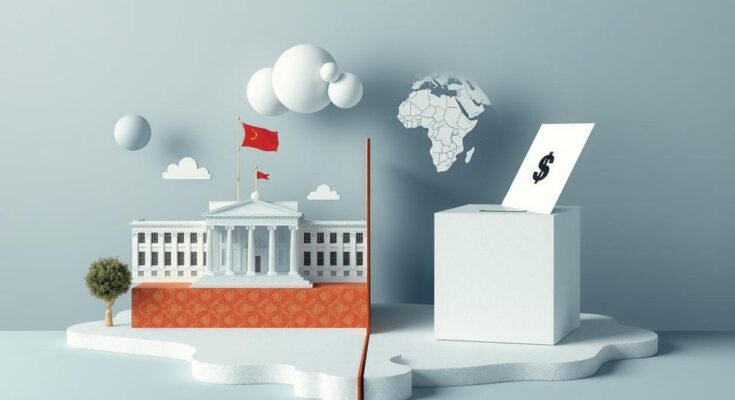Paul Webster Hare analyzes the evolving relationship between the Trump administration and Nicolás Maduro, emphasizing U.S. policy shifts and pragmatic engagements. Despite sanctions and non-recognition, pragmatic self-interest has begun to shape interactions. Hare highlights Venezuela’s dire economic situation and the implications of Chinese influence in the region, as well as the internal conflicts within the Trump administration. He concludes that U.S. policy will depend on prevalent internal dynamics and political priorities.
In a recent article for The Conversation, Paul Webster Hare, Master Lecturer in International Relations at the Frederick S. Pardee School of Global Studies and an experienced former diplomat, analyzes the intricate relationship between the Trump administration and Venezuelan President Nicolás Maduro. Hare notes a notable shift in U.S. policy during Trump’s second term, highlighting the administration’s refusal to formally recognize Maduro while maintaining sanctions and recognizing Maduro’s opponent, Edmundo González, as the legitimate president-elect.
Hare explores how pragmatic interests are influencing the interactions between President Trump and Maduro, even in the wake of widespread condemnation of Venezuela’s electoral fraud in 2024. The author cites a recent visit by Trump’s envoy, Richard Grenell, to Caracas, which resulted in the release of several detained Americans, and an agreement for the deportation of Venezuelan nationals from the United States. He suggests that Trump’s motivations are driven by his administration’s goals regarding immigration rather than broader geopolitical concerns.
Drawing from his diplomatic expertise, Hare indicates that Maduro’s cooperation with the Trump administration is likely motivated by economic necessity. He argues that Maduro’s willingness to engage on issues such as hostages and immigration reflects a desire to prioritize self-interest, which is crucial for preserving his regime amidst Venezuela’s challenging economic climate.
The analysis also highlights Venezuela’s dire economic conditions, with about 80% of its population living in poverty as a result of years of U.S. sanctions. Hare posits that Maduro will likely strive to maintain oil industry exemptions granted under the Biden administration to prevent a total economic collapse.
Furthermore, Hare does not shy away from characterizing Maduro’s 2024 electoral victory as one of the worst frauds in Latin American history. He underscores that evidence from computer printouts indicated that the opposition, led by González and Maria Corina Machado, had won the election convincingly, yet Maduro declared himself the victor without any substantial proof.
Hare delves into the conflicting views within the Trump administration regarding its approach to Venezuela, noting that several officials, such as Secretary of State Marco Rubio, maintain vehemently anti-Maduro stances. Rubio has referred to Maduro’s government as a “narco-trafficking organization” and has overseen the confiscation of a Venezuelan aircraft.
A significant aspect of Hare’s exploration includes China’s increasing influence in Venezuela, noting that Chinese President Xi Jinping congratulated Maduro on his disputed election victory, contrary to the stance of Western leaders. “China’s influence with Maduro represents a breach of a long-standing vision of the U.S. as a regional hegemony,” Hare remarks.
In conclusion, Hare suggests that the Trump administration’s eventual stance toward Venezuela will hinge on the influence of various factions within the administration, as well as on the political constituencies President Trump chooses to prioritize. The administration’s ambivalent actions—concurrently engaging and antagonizing Maduro—reflect the competing interests that shape U.S. policy toward Venezuela.
The relationship between the Trump administration and Nicolás Maduro is characterized by complex dynamics of pragmatism and competing interests. Despite ongoing sanctions and official non-recognition, interactions driven by self-interest suggest a nuanced engagement, particularly as economic conditions in Venezuela worsen. Ultimately, the direction of U.S. policy toward Venezuela will depend on internal influences within the Trump administration and the priorities of different political factions.
Original Source: www.bu.edu




